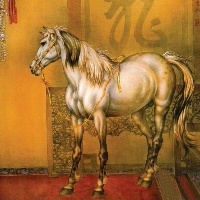中考英语易错题十七、语言交际的用法
十七、语言交际的用法
【中考链接】
—Do you mind if I record your lecture?
—__________. Go ahead.
A. Never mind
B. No way
C. Not at all
D. No. You'd better not
[答案]C
【解析】
此题考查交际用语。题意为“我录下您的演讲您介意吗?不介意,录吧!”根据Go ahead可知对方同意了请求,所以说“不介意”。故选C。
【中考考点】
考查语言交际的用法。
【易错提醒】
学生会选择D,这是陷阱。如果不同意,回答应选择A. Never mind不要紧,没关系,用来回答别人道歉或安慰别人。No way没门,不可能,和语意不符。
【知识要点】
1.特别注意下列情景对话及回答:
1)—Would you like some tea?(你想要一些茶吗?)
—Yes, please. /No, thanks.(要/不要,谢谢!)
2)—Would you like to join us?(你想参加我们的活动吗?)
—Yes, I'd like (love) to. /I'd like to but…(想……)
3)—Would you like me to help you with your English.(你想要我帮助你英语吗?)
—Yes, please. /That's very kind of you.(要。/你真好。)
—No. thanks. /No, thank you. I can do it myself.(不,谢谢。/我能自己做。)
4)Shall I…?(主动提供帮助)“要我……吗?”。如:
—Shall I open the window?(我能开窗吗?)
—Yes, please. /Yes, thank you.(可以。)
—Shall I buy the book for you?(要我为你买书吗?)
—No, you needn't.(不,不需要。)
5)Shall we…?(提建议)“我们一起做……好吗?”。如:
—Shall we go to see a film this evening?(今晚我们去看电影好吗?)
—Yes, let's. /All right.(好。)
—No, thank you.(不。谢谢你。)
2.祝愿、祝贺和应答(Good wishes, congratulations and responses)
1)—Well done and congratulations to you.
—Thanks very much.
2)—I hope you'll succeed in everything.
—So do I.
3)—I wish you success.
—Thank you.
4)—We send you our best wishes.
—Thank you very much.
5)—Happy New Year!
—Happy New Year! (The same to you.)
6)—A merry Christmas to you.
—Thank you.
7)—I hope you'll have a good time.
—Thank you.
8)—Happy birthday!
—Thank you.
3.邀请和应答(Invitations and responses)
1)—Would you like to come to the party?
—Oh yes, thank you.
2)—I hope you can come to the dance next Saturday.
—I'm sorry, but I can't.
3)—Will you go dancing with us?
—Of course. I'll be glad to.
4)—Will you come to our English Evening?
—Yes, thank you.
5)—Would you please give us a talk on English Learning?
—OK. When?
6)—You and your friends must come over to my house and see mooncakes.
—OK. Thank you very much.
4.表示同意和不同意(Expressing agreement and disagreement)
1)—I think the shop is closed at this time of day.
—No, I think it's open.
2)—I think foreign languages are more interesting than science.
—I really can't agree with you. I prefer science.
3)—I think I shall read a book instead.
—Good idea. That's much better than watching a bad TV programme.
4)—I don't think that it's true. He's always telling strange stories.
—I know. But this time I can't decide if he is right or not.
5)—I think Chinese is more popular than any other subject.
—Maybe. But I prefer art.
6)—Don't think in Chinese when you're speaking English.
—You are quite right.
5.道歉和应答(Apologies and responses)
1)—Sorry to trouble you.
—That's all right.
2)—Oh, I am so sorry.
—That's quite all right.
3)—I'm sorry to give you so much trouble.
—No trouble at all.
4)—I'm sorry. I lost the key to your bike.
—It doesn't matter.
5)—Sorry to have kept you waiting for a long time.
—It doesn't matter.
6)—You haven't paid for it yet.
—Oh, I'm really very sorry.
6.劝告和建议(Advice and suggestions)
1)—The park isn't far from here. Shall we walk there?
—OK.
2)—You'd better close the windows. It's cold in the room.
—All right.
3)—If you are not better by then, I'll take you to see the doctor.
—OK. Thank you very much.
4)—You must look after yourself and keep healthy.
—Yes, I will. Thanks.
5)—The museum is very far from here. Let's catch a bus, shall we?
—OK. Let's catch a bus.
6)—You must remember the saying: Whatever you do, do it well.
—Thank you for your advice.
7.打电话(Making telephone calls)
1)—Hello!
—Hello, Bill?
—No, this is Sam.
—Hi, Sam. This is Mike. How are you?
2)—Hello.
—Hello. May I speak to Mr Green?
3)—No. 5 Middle School.
—Mr Green, please.
—I'm sorry. Mr Green is not in.
—When will he be back?
—About six this afternoon.
—All right. I'll ring again then.
—Very well.
4)—Hello!
—Hello, Ham Mei. Could I borrow your Chinese-English dictionary please?
—Sorry! It's not a very good line. Could you speak more loudly?
—Could I borrow your Chinese-English dictionary?
—Sure. I'll bring it to you tomorrow.
—Thank you. Goodbye.
8.请求允许和应答(Asking for permission and responses)
1)—Please let me help you.
—No, thanks. I can carry it.
2)—Can I see your licence, please?
—OK.
3)—May I call you James?
—Of course, if you wish.
4)—Could I borrow a pen, please?
—Of course. With pleasure.
5)—Excuse me. May I use your dictionary?
—Yes, here you are.
6)—May I ask you several questions?
—Yes, of course.
9.提供和应答(Offers and responses)
1)—May I help you?
—Oh yes, thank you.
2)—Let me help you with the bags.
—Well, I can manage all right. Thanks just the same.
3)—Can we help you?
—I want to go to hospital. But I can't. My leg hurts.
4)—Must I clean the classroom now?
—Oh, you needn't.
5)—Would you like a cup of tea?
—Yes, please.
6)—What can I do for you?
—I'd like to have an English-English dictionary.
10.约会(Making appointments)
1)—Are you free next Wednesday evening? I want to go to the cinema with you?
—Yes, I'd like to.
2)—When shall we meet, this evening or tomorrow evening?
—I don't mind. Either time is OK.
3)—Are you free later today?
—Sorry, I'm free every day except today.
4)—Are you able to come tomorrow morning?
—I think so.
5)—Are you free this afternoon?
—Oh no. Will this evening be all right?
6)—I'm busy today. What about tomorrow afternoon?
—That would be fine. Shall we make it nine o'clock?
11.禁止和警告(Prohibition and warnings)
1)—Don't climb that ladder! It's broken.
—OK. Thank you.
2)—Look out! There's a car coming.
—Oh, thank you.
3)—You mustn't play on the street. It's dangerous.
—No, we won't.
4)—Don't touch the machine when it is working.
—No, I won't. Thank you.
5)—You are not allowed to smoke here.
—Oh, I'm sorry.
6)—You can't walk your dog in the park.
—Oh, I'm sorry. I'll never do it again.
12.看病(Seeing the doctor)
1)—I'm feeling tired, doctor.
—Have a good rest and then you'll feel better.
2)—How are you feeling today?
—I'm feeling even worse.
3)—Doctor, she is not feeling well.
—Nothing serious, I hope.
4)—Doctor, do I have to take the medicine before or after meals?
—Three times a day after meals.
5)—What's the matter?
—I've got a headache.
6)—What's your trouble?
—I've had a pain in my stomach since morning.
13.语言困难(Language difficulties)
1)—I don't quite follow you, Mr Green. Will you please say it again?
—OK.
2)—Do you follow what I'm saying?
—Sorry, I can't follow you.
3)—I beg your pardon. Will you say it again?
—All right.
4)—Will you say it again more slowly? I can't follow you.
—OK.
5)—Will you please repeat what you've just said?
—OK. I'll repeat what I have said.
6)—I'm sorry, I don't understand French. Do you speak English?
—Yes, I do.
【解题技巧】
历年来日常交际用语是语法与词汇选择题考查的重点之一。而且,多以英汉两种语言的不同表达习惯即两种文化差异来命题,在解答这种题型时,一定要留心目标语言的习惯表述,切莫以母语的思维、习惯和惯用法来答题。准确把握语言在真实的交际环境中使用的得体性是解决此类问题的关键。
 夜色朦胧 2022-10-06 06:48:14
夜色朦胧 2022-10-06 06:48:14









